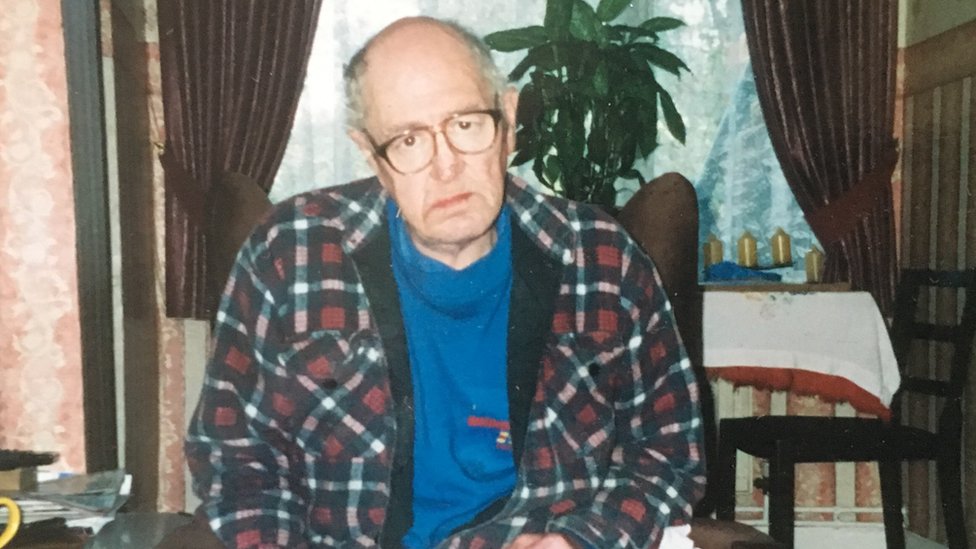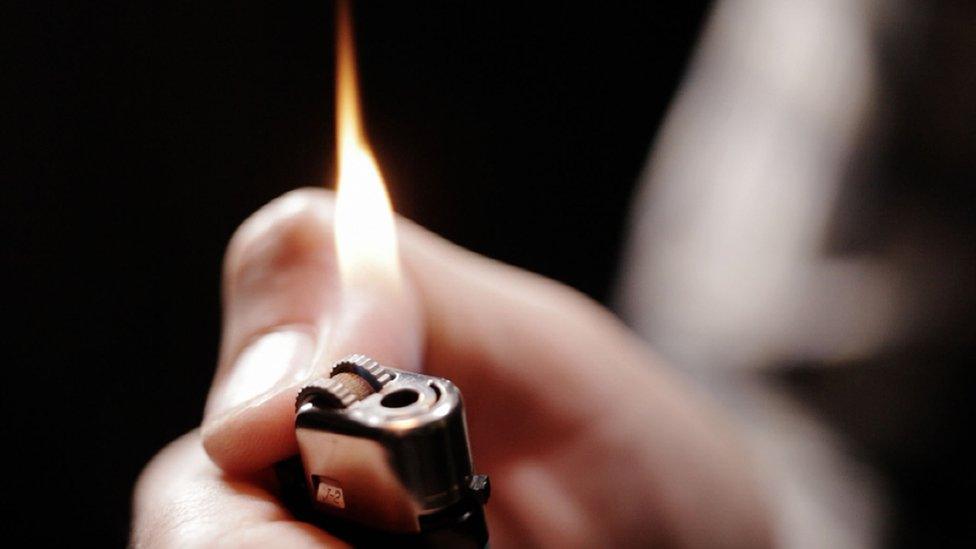Skin creams containing paraffin linked to fire deaths
- Published
Skin creams containing paraffin linked to fire deaths
Skin creams containing paraffin have been linked to dozens of fire deaths across England, the BBC has learned.
The products for conditions like eczema and psoriasis can leave people at risk of setting themselves ablaze.
If people use the creams regularly but do not often change clothes or bedding, paraffin residue can soak into the fabric, making it flammable.
The medicines regulator has updated its guidance and says all creams containing paraffin should carry a warning.
Despite warnings going back more than 10 years, BBC Radio 5 live Investigates has discovered there have been 37 deaths in England since 2010 linked to the creams.
'Sneaky cigarette'
Carol Hoe's husband Philip died after accidentally setting himself on fire at Doncaster Royal Infirmary in 2006 when sparks from a cigarette reacted with the emollient cream he was covered in.
"I got a phone call from the ward sister to say can you get to the hospital as soon as possible, Philip's had an accident," she said.
"Philip had caught fire. He had sneaked off onto a landing for a sneaky cigarette, a gust of wind must have caught the lighter, and it set fire to him."
'Engulfed in flames'
Within seconds Mr Hoe, who was receiving treatment for psoriasis, was engulfed in flames and he died shortly after being transferred to another hospital in Sheffield.
"When we got there, the staff came to me and told us he was covered with 90% burns," said Mrs Hoe.
"There was nothing they could do."
The coroner at his inquest drew attention to the dangers posed by skin creams, and the now defunct National Patient Safety Agency advised that paraffin-based products are easily ignited with a naked flame if used in large quantities.
The Medicines and Health Care Products Regulatory Agency later issued two more warnings, but deaths continued to occur.

Sparks from Philip Hoe's cigarette reacted with a cream he was covered in
The coroner at the inquest into the death of 63-year-old Christopher Holyoake in Leicester in 2015 heard his bedding was covered in residue from an over-the counter dermatological cream called E45.
When the flame from his cigarette lighter came into contact with the bedding, the residue acted as an accelerant, giving Mr Holyoake little chance of surviving the fire.
After the inquest the coroner wrote to the manufacturer of E45 - outlining her concerns there were no warnings on the packaging about the product being highly flammable.
Pipe smoker died
E45 has since agreed to include a flammability warning on some products and these will find their way onto shop shelves from next month.
Also in 2015, an inquest into the death of 84-year-old John Hills heard he died in a nursing home in Worthing, West Sussex, after setting himself on fire with his pipe.
A paraffin-based cream called Cetraben had soaked into his clothes and was found to have played a part in his death.
The coroner said he was concerned the dangers associated with the cream were not widely known. The manufacturers say they intend to carry out a review of the safety information included on their product packaging.
5 live Investigates approached all 53 fire brigades in the UK to find out how many deaths had been linked to the use of paraffin-based skin creams since 2010.
Just six from England provided information - revealing the 37 fatal incidents. The majority came from the London Fire Brigade which reported 28 fatalities.
The problem has become sadly familiar to Darren Munro, borough commander for London's Wandsworth Fire Station, who has been campaigning to raise awareness.

Christopher Holyoake died after his bedding, which was covered in paraffin residue, caught fire
"In four out of the last six fatalities that I've personally attended, I would say the emollient cream has had a direct result in the flame spread and the speed at which the fire took hold," he said.
"The creams themselves aren't dangerous, it only becomes dangerous when you mix it in with other factors."
London Fire Brigade says even regular washing of night clothes and bed linen might not eliminate the danger, unless it is washed at a high temperature, as paraffin is invisible and can accumulate over time.
True scale unknown?
Mr Munro suspects the authorities are unaware of the true scale of fires related to skin creams.
"One of the fatalities that we dealt with, unfortunately, the individual had had a previous fire, which wasn't reported," he said.
"The carers or a neighbour had put the fire out, so therefore the London Fire Brigade weren't called.
"I would imagine that there have been numerous other instances where people have been injured, but because the flames have been extinguished, people haven't called the fire brigade".

Fires have been caused when a naked flame has ignited paraffin residue
Until recently, the Medicines and Healthcare Products Regulatory Agency only asked that a flammability warning be put on packaging if a cream contained more than 50% paraffin.
The agency is now urging manufacturers to add a warning to the packaging of skin creams containing any paraffin.
And since being alerted to 5 live's findings, the organisation representing manufacturers of branded over-the-counter medicines has said it will explore whether all paraffin-based creams should carry a warning as standard.
John Smith, chief executive of the Proprietary Association of Great Britain said some manufacturers had already taken that step.
Wife's anger
He added the association wanted "to reassure people that the normal use of emollients in the home is considered appropriately safe provided the products are used in accordance with the on-pack instructions and accompanying patient information leaflet.
"Manufacturers of emollients are not at present required by regulation or statute to include fire safety warnings on packaging. Safety is nonetheless of paramount importance."
More than a decade after her husband died, this all seems too little, too late for Carol Hoe.
"To be quite honest I'm really angry because at the inquest, the coroner said that further steps should be taken to give people warnings about this and for nearly 40 more deaths to happen after Philip, I just can't understand it," she said.

5 live Investigates is on BBC Radio 5 live, 19 March at 11:00 GMT - catch up on BBC iPlayer Radio.
Have you got something you want investigating? We want to hear from you. Email 5liveinvestigates@bbc.co.uk